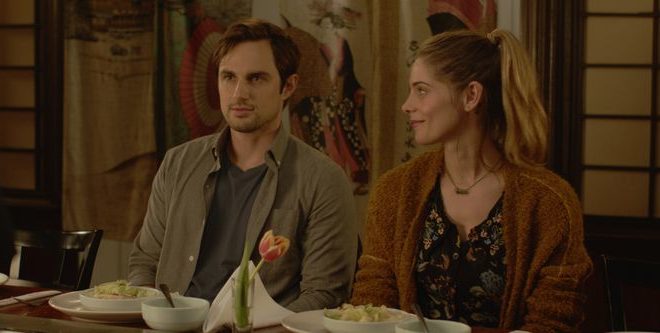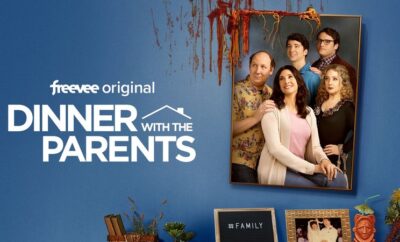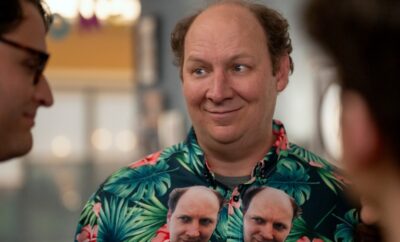
Interviews
Andrew J. West – Antiquities
By: Jamie Steinberg
Q) What made you want to be a part of the film Antiquities?
A) I feel like, if I’m not mistaken, I was sort of cast early on and then I just really liked the script. I decided to do the script and then when I saw they were getting Michaela [Watkins], Michael Gladis and Ashley Greene, all these great actors, it just made it more and more exciting.
Q) You often take on dramatic roles and this was such a great mix of drama and comedy. Was that something you were looking forward to with this project?
A) Yeah, I was. Absolutely. I love to do both and I’ve been lucky enough up to this point to be given the opportunity to do both. When I first started acting (I guess you would say professionally) I was actually pretty much doing comedy. I did a lot of multi-cam sitcoms and was kind of active in that whole world. Then, I slowly started to move into dramas and did that almost exclusively for a while. In any case, I really love bouncing back and forth and another reason why I liked this script so much (for a lack of a better term) because I’m the straight man in the movie. It’s great and there are some serious heavy moments and I got to sort of jump into this comedic world and play a little bit. Any opportunity I get to do both is the best for me. That’s what I’m looking for, for sure.
Q) How was the premise for the movie originally described to you?
A) [laughs] It’s a good question because every time I’m asked to describe this, I feel like I give a completely different answer. I don’t know if it was ever initially described to me, to be honest. I think initially I was sent the script by my agent and they said, “Hey, this is interesting. You should take a look at it.” So, I guess the premise was “this is interesting.” [laughs] But I read it and really loved it. Then, what really put it over the edge for me was having a long phone conversation with Dan Campbell, the director. We talked on the phone for like an hour and a half or something like that just about the movie and our lives and our histories and for him where the movie idea came from. Ultimately, when it comes to the premise of the film, I think it’s a movie that kind of encapsulates a lot of things that we all deal with at some point in our lives – grieving, how to deal with loss, the discovering of yourself and who you really are, what’s important to you, etc. It has all of that in it and I think that’s why it’s universally relatable. In addition to that, it’s funny as hell, too. So, it’s not this sort of philosophical slog through what’s the meaning of all of this. It’s really enjoyable to where you can kind of sit back and laugh while you’re going on that journey, too. I think that’s why it’s special.
Q) Was there anything you added to Walt that wasn’t originally scripted for you?
A) [laughs] Yeah…Not in terms of lines really. For me, I stuck pretty close to the script and, honestly, for such a talkative film Walt’s dialogue is pretty sparse in the script and in the film. Walt isn’t the talkative one in the film. He just sort of sits back and receives this onslaught of dialogue from all these crazy characters. Even in the script we don’t hear him say a whole lot until probably like the final act of the film. Maybe a little bit in the therapy sessions. So, I wasn’t doing a whole lot of ad libbing or anything like that in terms of lines just because I didn’t really need to. For me, I wanted to make sure that we eventually saw this kind of warmer side to the character because when we see him, he’s kind of closed off. We don’t really know what to make of him. There almost could be like a little bit of a standoffish quality to him and I think it’s because he’s so wrapped up in his own mind and he is on this journey and trying to figure these things out. It’s hard for him to really open up or make himself accessible to the people around him. I just felt like it was going to be important for the audience to get behind him if we see some real moments of warmth, even in places you might not necessarily think they’d be. Like one of the moments I think I wanted to not change, but bring something specific to was when he first sits with Jimmy Lee (Graham Gordy. I think in the script it was just sort of described as like Walt is really taken aback by him and he doesn’t know what to make of this crazy guy. And that is in there and it needs to be in there, but I also wanted it to feel like Walt liked the guy to a certain to degree. Yeah, this guy is weird and we don’t know what is going and it’s kind of uncomfortable, but at the same time like I want to be friendly and I want to connect with this person on some level because he seems like a decent, nice guy. I think it was just things like that that were important for me, personally, to bring to that. To what degree I succeeded I don’t really know, but that was my attempt anyway.
Q) Walt is coming back home to relive his father’s life to get perspective. What are some revelations he has in his journey?
A) Generally speaking, it’s kind of like – I think it is for all of us…We have a tendency to mythologize and build up these figures in our lives, whether they are family members that are older that we didn’t know very well or didn’t know at all…We have a way of kind of putting people in a box of “he was the hero” or “this person was a coward” or “this person was really intelligent” – that was the one thing that defined them. I think what is interesting and cool is that Walt finds out this guy who was his father was way more complicated than just any one attribute that you could assign to him. He learns that his father was into boxing and had no clue. He went his entire life and had no clue that his dad was ever involved with something like that. He knew that his father had flaws and that kind of gets confirmed for him, but in other ways he finds out his father received a certain amount of redemption and was a much better person in a lot of ways than Walt ever know that he was. I think all of those things make that part of that story interesting and rewarding as the story unfolds.
Q) Talk about the chemistry between Walt and Ellie.
A) I think it’s a traditional instance of opposites attracting. You couldn’t get more different than these two characters. Ellie (Ashley Greene) is bubbly and outgoing and she’s a practical joker and in your face. And Walt is very much an introvert and kind of tightly wound, as she even says to him early on in the film. That I think is the initial attraction for both of them and it makes it kind of work. They sort of balance each other in a nice way. A cool thing we get to see is Walt sort of brings out a more earnest, deeper side to Ellie and Ellie kind of gets him to loosen up a bit as the movie goes on. I think that’s why that relationship works. And that was something Ashley and I spent a lot of time talking about and rehearsing and kind of getting down before we actually went in to shoot.
Q) There were some great scenes with you and Mary Steenburgen. What was it like working with such an iconic actress?
A) Those were some of my favorite scenes and it was so cool. In fact, I made an audition tape for Dan and the producing team just to make sure that we were all on the same page for the character and the tone and all that. I feel like I requested doing some of the scenes in the therapist sessions. That was what I really wanted to do because I thought they were some of the funniest and most interesting scenes. I made a tape of doing those scenes initially and they sort of based their decision to cast me partly on that. Then, when we went into shoot them that day – Mary is obviously very busy. We only had her for one day and we shot all of those scenes in one day, if I remember correctly. She was absolutely amazing. She came in ready to go and she’s such a good actor. We talked about ad libbing and the most sort of playing around that I did was probably in those scenes. I remember kind of trying them and we both tried them from different angles and we were both moving through them quickly enough to where we could play with those a little bit. They were just so fun and hilarious. It was definitely one of the best days on set having her around and having the scenes go so well. That was an exciting day, for sure. I was such a fan of hers for so long that it was just so cool to be able to do some scenes with her.
Q) What advice did director Daniel Campbell offer during filming that you took to heart?
A) Well, the interesting thing about the character is that I sort of realized after I was cast and once we started working and was having conversations with Dan was that a lot of who this guy was is kind of based of who Dan is. It wasn’t so much necessarily him giving me advice or telling me these are the ways to approach these kinds of things. It was more a matter of me wanting to spend as much time around him and through osmosis to get a sense of who he was and how he handled interpersonal interactions and how he responded to people. The good thing was that he and I hit it off pretty quickly. Every day when we would wrap, he and I would go get a drink or a quick dinner or something and just talk – talk about the day or whatever. Through that process I was getting to know him better and also, I was trying to gobble up him as much as I could in terms of the way he was. And I tried to use a lot of that in what I was doing because I realized it was so close to him and the character was so much born out of the way that he is. So, that was the way that he kind of transmitted. It wasn’t advice, like I said, but it was a like a vibe transmitted to me about who this guy was.
Q) What were some of your most memorable moments from filming?
A) The only other thing that was really special about this one was I got to work with at least one and really more than one actor that you wouldn’t call (and it’s kind of a loose term) “professional.” Like Roger Scott, who isn’t really…Acting isn’t really his day job. That isn’t really what he does. He works in radio and he was sort of called upon to step in and work on this film. He did it so amazingly and he had a lot to do. I remember thinking, “Well, this could go one of two ways if they are getting a guy who doesn’t really have much experience acting and if this isn’t what he really does it could go really wrong because this guy has a big role and a lot dialogue. He’s really got to be funny.” And he was an absolute revelation in the movie! I just thought he was so amazing and so funny. In doing scenes with him I couldn’t believe that he hadn’t been doing this for decades. That’s the way it felt me to me, that he was just such a pro at it. So, that was cool because you don’t typically see that. Usually when you are working with someone who doesn’t have experience it kind of shows, but it just wasn’t the case with him. Then, to get to work with Graham Gordy in front of the camera (because he’s a writer and producer on the film)…He’s a very accomplished writer and he’s done some acting before, but to get to see how talented he was as an actor firsthand (getting to do scenes with him) was a really cool experience that you don’t’ always get as an actor. So, those were definitely special experiences that came out of this, too.
Q) What did you personally take away from working on this movie?
A) I think it made me really think a lot about acceptance, which as I get older, I realize how important that is for everyone just to lead a happy life. I think a lot of what this movie is about is discovering who you are and finding the truth out about the people that are close to you. Then, also it’s coming to a sense of acceptance in terms of your decisions, the decisions of others and how things have kind of shaken out for you. It was something that really made me think about things and it made me realize how important that is. You know that, but it is rare that we really think about it and I think working on this really made me meditate on that a lot while we were shooting. Aside from that, I met a lot of amazing people that I still keep in touch with. I made some friendships on the film, which is so awesome when that happens because it doesn’t always happen. It’s not because you don’t necessarily like the people you are working with. You may really like everybody, but you just don’t really end up keeping in touch or having a lasting relationship. But it wasn’t the case on this one. I really kept in contact with quite a few people on this it’s cool that it happened.
Q) What would you like to say to everyone who is a fan and supporter of you and your work?
A) The main thing that I can say to anybody who supports my work and what I do is a massive thank you because that’s the only reason I get to have my dream job. It really is my absolute dream job and I wouldn’t be able to do this if there wasn’t an audience for it. It means everything to me. A lot of actors don’t get the opportunity to go around and do some of these conventions and stuff. The only reason I’ve been able to do some of these is because I’ve worked on some specific genre shows. It’s kind of a bummer that there aren’t more of them for all of the wonderful actors who don’t necessarily work in genre specific stuff, but because of some of the genre shows I’ve worked on I’ve gotten to do that. It’s one of my favorite things to do because it’s so nice to be able to meet people who appreciate some of your work and tell them thank you for making this possible for me. So, it’s a really special thing and it only exists because people watch it and want to see it. So, I’m hugely grateful for that.




You must be logged in to post a comment Login